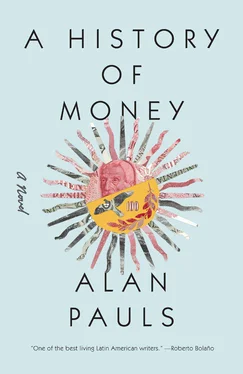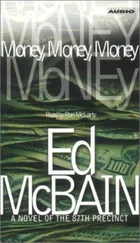Yes, paying, and all of its attendant sibylline delights: turning around and walking away from the cashier’s window with his heart still in his mouth, as though he’s just received a pardon, and putting the precious stamped receipt safely in his pocket with an excitement he’s barely able to conceal, and later on stapling it — that adorable crunch! — to the bill, crossing it off his list of debts, and, finally, filing it away in the clear plastic file where, one by one, his receipts from accounts paid all end up, each one a trophy of a vice that he never dares to share with anybody. This all strikes him as so contemptible and miserly that he’d find it very difficult to confess; it’s like the pleasure a bank teller takes in tracing and savoring the dirty scent of money on his fingertips, or a night guard in spotting couples on the garage’s security cameras. And afterward, once the receipt’s been filed away, comes the feeling that he can start again from zero: he’s young again, virginal, free to look for the next payment on the list … Though it’s hard to believe, this bureaucrat’s pleasure is the thing that excites him most about living on his own for the first time — much more than the possibility of organizing his time and space as he wishes, without having to answer to anybody, or the freedom to invite over whomever he wants, whenever he wants, for whatever reason he wants. Just that: paying his bills, much more than all the things that are normally understood by sovereignty, at a time — he’s just turned twenty-one — when after four crushing years of terror, the experience of sovereignty survives only in the private realms of life, in homes, bedrooms, basements, rooms as far as possible from the street and public life. For him, gaining his freedom, a phrase that’s been emptied of all meaning apart from the individual departure from the nest, primarily means discovering an unexpected form of alchemy that makes a typical adolescent nightmare pleasurable, even glorious: Will I have enough money to pay the bills every month? Paying, paying: the principal enjoyment of the adult life he’s trying on for the first time. What a joy to arrive at the beginning of the month and have to pay.
There’s nobody else in the world who can keep time’s accounts like his father does. His father, who will die without a penny, broke, as they say, leaving half a dry lemon and a withered lettuce in the fridge and a collection of dusty jazz records on two shelves held up by bricks, and taking his mental calculator to the grave with him, having never, even for a second, stopped shuffling quantities with it, or adding and multiplying years and money; calculating ages, the duration of marriages, flight times, and time differences between countries; converting dollars to pesos, pesos to dollars, official dollars to black-market dollars; figuring out the attendance at protests, soccer matches, film screenings; predicting the commercial success of new theatrical undertakings; or prorating ticket-office takings according to numbers of cinema screens. He, of course, is always quick to lose count, but what he does know is that years later — at least ten or fifteen — it’s not just on the first of each month that he gets to enjoy the pleasure of paying, but rather, to his delight, every Friday of every week, four times a month—“like clockwork,” per his father’s description of the regularity with which he does three things in life: shit, fuck, and play poker — for the eleven never-ending months it ends up taking to refurbish the apartment he buys fifty-fifty with his wife — two and a half times longer than the time frame the architect quoted without hesitation at the beginning of the project. Every Friday at half past six or seven in the evening, he runs up those three long flights of stairs with his pockets bursting with cash. The contractors are in the apartment’s living room, smoking while they wait for him surrounded by wooden beams and piles of bricks. He comes in, greets them with a monosyllable and a nod of the head — the same currency they use to communicate with him for the duration of the job, whether they like him or not — and sits down in the kitchen, or rather the dilapidated hovel where according to the architect’s drawings there will someday be something resembling a kitchen, and with a wad of notes in his hand, he shouts, “First one’s up!” Thus begins the weekly round of payments. And so it is, every Friday.
Anyone else in his position would have exploded already. Not just because of the way the completion date keeps being pushed back, which is annoying and even slightly insulting in light of the smile and the slaps on the back the architect tries to placate him with every time he asks for explanations, distracting him by pointing out sheets of colored mosaic tiling, the antique floor tiles he found at the salvage yard, and the period toilets waiting their turn in a corner, three apparently more than sufficient justifications for him to accept the delays, even to enthusiastically approve them, as the price he must pay for the inspiration and good taste of a sublime architect. In fact, the truly hellish thing is the inflationary disaster in which the country is burning up day by day, which surges a fortnight after work begins, accompanies the refurbishment from beginning to end, sending the agreed budgets into orbit and making a mockery of every estimate, and will outlive the project by a year and a half, an insane period during which it devours everything that gets in its way, not only his money, his time, his nerves, and his already fragile relationship with the architect, but also his love. Love: the only reason he put all his money — the only money he has or will ever have, aside from that which literally comes out of the past, like a ghost, raining down on him on the very same afternoon that he has to cremate his father — into the purchase of an apartment that is what’s known as an opportunity: underpriced, immediate sale, almost abusive terms of payment, which the seller accepts without saying a word. But these benefits are no compensation for the problems he and his wife discover later, when, exhausted by eleven nightmarish months of construction, they move in and experience for themselves the fierce hostility of the neighbors (all more than seventy-five years old, all deaf), the vibration of the machinery in the textile business next door against the apartment’s south wall from eight in the morning until five in the afternoon, the neighborhood’s unreliable drains, the criminals-in-training who meet on the corner, the piles of broken glass from car windows gleaming by the side of the curb, the always-out-of-date goods at the local stores, the smell of rotting in the produce stores and insecticide in the bars, the sparse bookshops, the outdated film screenings, the faded posters in the video shop, and above all the unbearable, almost radioactive heat that melts the treeless roads and beats down all summer long on the building’s leaky roof terrace — which is to say, on the roof of the brand-new home that they don’t even manage to share for two months.
Prices change overnight, from hour to hour, sometimes two or three times in the same hour. Sometimes he comes back from the building supply store empty-handed, having been unable to buy anything. “We don’t have any prices,” they tell him. Other times — and this happens very often — he counts out the cash he owes while he’s lining up in front of the register, but when he gets to the window he has to calculate it all again. The price has gone up 10, 15, sometimes 20 percent in the tiny interval — no more than ten, fifteen minutes — between the last markup and his turn to pay. The same thing happens every Friday afternoon, ten, sometimes five minutes before the financial institutions close, when he turns up with his weekly installment of dollars in the usual filthy den in the business district, the lair of a money changer his father trusts, an affable man who’s suffocating under his own weight, and who takes advantage of each of his visits to draw him away from the line and, lowering his voice to the confidential tone people usually use to reveal the secret of the country’s economic future, bombard him with stories of his father’s other life, his real, completely fantastical life, which when he relays them to him just as he heard them, his father is evidently a little disconcerted to hear, neither accepting nor denying anything but, finally, smiling and saying he doesn’t remember anything about it. And just like that, in the few minutes it takes this legendary father to clean out a sheik in Monaco, or break the bank in Baden-Baden, or get locked up for claiming responsibility for the urine with which a tourist in his charge decides to leave his mark on the ruins of Pompeii, the peso has depreciated so vertiginously that the pockets of the jacket he wore especially for the occasion, which were tried and tested in the same basement the previous Friday, in front of the same redheaded cashier who counts money with one hand while peeling the other’s cuticles with his teeth, can’t accommodate the heap of australs he receives in exchange for his dollars.
Читать дальше












